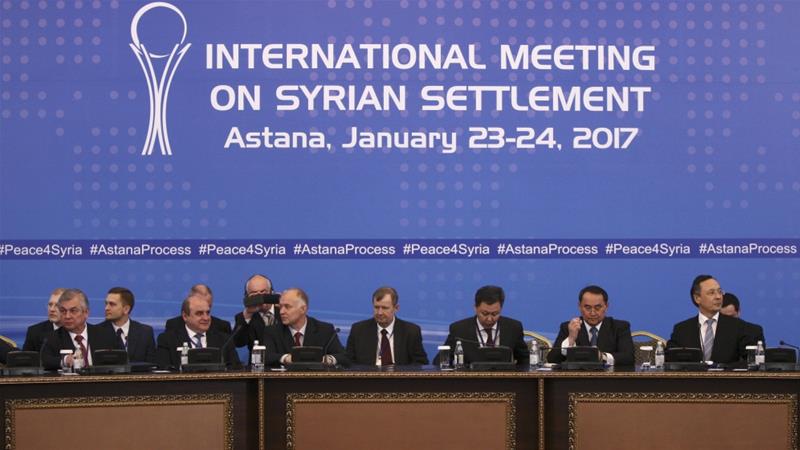During the years of war and negotiations, Damascus’ regime allies resorted to lessening political pressures on them by selling empty promises. They would say something like: “Don’t worry. We are seriously considering changing Bashar al-Assad and putting an end to the fighting.”
Then few weeks later, an interview is published in some newspaper clarifying that “we don’t care about Assad and we accept changing him, but only after Assad finishes his presidential term. We don’t want to violate the constitution.”
Everybody eventually waited, elections occurred in 2014, and the president won in per his usual play.
Then, days pass by and battles intensified and Assad’s forces retreated after which pressures were exerted and promises made. They’d say: “Be patient. We are looking for an alternative for the regime, or at least for the president himself.”
After a long wait, Assad allies announce they accept a political solution based on a joint government with the opposition.
Then, after months of talks, another clarification is released saying the opposition they meant is the one affiliated with the regime and has nothing to do with the “real opposition.”
The war is back and worse than before. When crimes are committed, pressures are once again exerted and regime allies announce they are discussing new ideas for a peaceful solution. They even hint at changing the president.
Later, they submit a new political project: “We agree on a president elected by the Syrian people”. That is both nice and reasonable. But when we go into details, which people do they mean?
The people they meant are the ones in regime-controlled areas. Whereas the 16 million other Syrians outside their authority are considered terrorists.
And so, the situation deteriorates and wars return and so do promises.
The opposition doesn’t win and neither does the regime. Because of the killings and deflections, the regime is only left with a small part of its army and security forces.
The regime forces are mostly a combination of foreign militias organized and managed by Iran.
We have learned never to believe any of the Syrian and Russian political projects. It is a negotiation tactic aiming to calm down international protests, neglect demands, and drain the enthusiasm and with time no one gets anything.
I assume this is happening now in Astana talks. Very reassuring information were leaked about the negotiations to an extent were we can sense it is only for media consumption.
The sources claim that Russia agreed to replace Assad and even suggested alternatives for him! Whether they truly say it or not, recent years have taught us that promises are lies. Keeping in mind that the bigger the promise the faker it becomes, they are just traps to let go of the demands. They will be followed by explosive barrels, more displacement and increase of chaos in the region.
Let’s ponder about this. Can the Syrian regime’s allies feel the need a reasonable political solution and end all those charade of delusional political resolutions?
There is at least one case which prompts them to be engaged in serious negotiations and end the war. The solution lays in lifting the ban on arming the Syrian opposition. Positions will change if Syria became a large swamp for Iran and its militias. Only then would Tehran be forced into serious negotiations.
Now, war is relatively cheap for Iran. Whenever a thousand Iraqi or Pakistani or Lebanese fighters die, they replace them with one thousand new ones. But, they are not losing airplane or armored vehicles because the armory of the opposition’s weapons are simple like: AK47, RPG, and locally developed weapons such as the hell canon.
As long as Iran’s losses in Syria are mostly human and of other nationalities with inexpensive political costs, they can proceed with their regional project and this war thus goes on for years.
Opposing sides usually reconcile under the pressures of battle losses. But, the losses in Syria are mostly of foreign fighters imported by the Assad regime, or civilians on the other side bombed with barrels or launching missiles without any means of defense.
That’s why we see in the Syrian war a larger number of displaced citizens than any other war. They have exceeded the 12 million because their only available method of defense is to just leave. If the aim is a reasonable political one, then it requires the reconsideration of dealing with and arming the opposition in order to make everyone sit at the table of negotiations.
